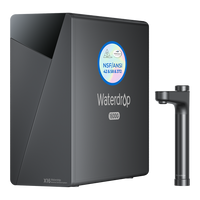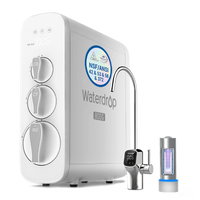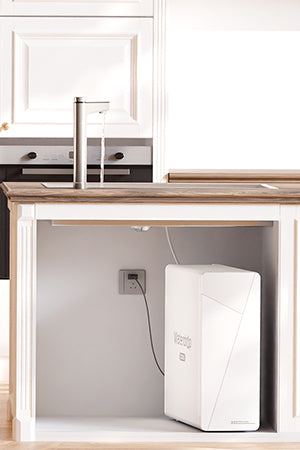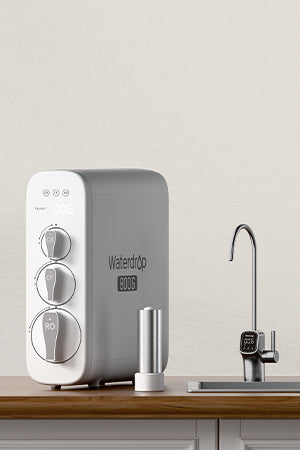Have you ever flipped the switch and seen your tap water become milky, foggy, or cloudy? If yes, you're not alone. It's a common occurrence many Canadians have to go through at some time — particularly in winter or just after plumbing has been done.
But when does your water become cloudy? Is it still okay to drink? How can you clear it out? In this piece, we'll examine the most prevalent causes of cloudy tap water, when it could be a sign of trouble, and how you can have your water sparkling and pure.
What Causes Cloudy Tap Water?
Milky or white water, or cloudy water, as it is otherwise referred to, has a number of possible causes. It's usually harmless and due to air or temperature variance. It can, on occasion, indicate something still brewing in plumbing or water quality issues. The following are the chief reasons:
Click here if you want to learn more about
Where in Canada Has the Best Tap Water?
1. Small Air Bubbles (Most Frequent Cause)
For the most, cloudy tap water is the result of air bubbles being trapped in your water.
When cold water passes through pressurized pipes, it contains more air. As it gets to your faucet and the pressure releases, the air escapes from the water as millions of tiny bubbles — like popping a bottle of sparkling water.
You may check this out by filling a clear glass with water and observing it for a few minutes. If the cloudiness rises from the bottom and disappears from the top, it's probably because of air bubbles.This is quite normal and not a health concern.
This trick is more likely to happen in cold as water temperature influences how much air may be dissolved in it.
2. High Water Pressure
When
water pressure in your pipes gets too strong, it can also lock air in pipes. When you try to use the tap, you'll release the air and end up having cloudy water. If you spot that your tap kicks or you get air in several faucets, you ought to have a plumber test your water pressure.
3. Temperature Variations
Difference in temperature between your air and water may also cause water to become cloudy. When cold water from cold underground pipes flows into your hot house, the temperature shift makes air precipitate out of solution as temporary bubbles.
Again, a harmless occurrence that tends to clear once the water rests for a few seconds.
4. Detrital or Mineral Content
Mucky water may occasionally be a consequence of sediment, calcium, or particles of magnesium in your water. If you are in a water-hard region, there are times when the build-up of minerals could make your tap water seem cloudy. Read more:
Is Canadian tap water hard or soft?
While these are not harmful minerals, they may:
- Scour white marks left on dishes or faucets.
- Shorten the life span of appliances such as kettles and coffee makers.
- Influence the flavor of your water.
Utilization of a water filter that has a function of discarding hardness minerals or a reverse osmosis system installation may lower it.
5. Plumbing Work or Building Work
If your town has just been repairing local water mains or if plumbing has been repaired, murkiness could originate from agitated sediments within pipes. These microscopic particles — like sand or rust — may occasionally fall into your kitchen-sink water. Typically, allowing your faucet to run for a few of minutes will clear out the debris.
6. Gas in Well Water
If your home uses well water, cloudy water could come from naturally occurring gases like methane or carbon dioxide trapped underground. While generally not problematic, too much gas in water may occasionally lead to bubbling or gurgling.
In this situation, a water test professional is advised to determine the gas and to know if there is a need for treatment.
Can You Drink Cloudy Tap Water?
For the most part, yes — murky tap water is okay to drink when it's due to air bubbles or cold water. Both are natural and temporary occurrences. But if it doesn't dissipate after a few minutes, or if your water also contains:
- A pungent smell (e.g., rotten eggs, chlorine, or metal)
- A tawny or amber shade
- A coarse texture
Then it may be something more serious — like sediment, or bacterial, or
chemical contamination . In that case, you are advised not to consume the water until you find the root cause.
Why Is Hot Tap Water Cloudy?
You may become aware that your hot water seems murkier than your cold water. This is due to the fact that hot water contains fewer dissolved air particles when compared to cold water. When you enable the hot tap, heat makes dissolved air vent out rapidly, creating minute and tiny particles that give it a milky appearance.
Again, perfect okay and safe. But if your hot water remains cloudy or deposits sediment, there may be a problem with your water heater — perhaps sediment accumulation or rust. Flushing out your water heater every twelve months helps to have clear water and extend the heater's lifespan.
How to Prevent Cloudy Tap Water?
Though you cannot always prevent air bubbles or pressure variations, you can prevent or lessen the cloudiness in your kitchen-served tap water:
- Keep your plumbing in good condition: Replace worn pipes and scrub aerators periodically.
- Empty your water heater once a year: Blocks sediment buildup that can lead to murky hot water.
- Install a whole-house or under-sink RO water filter : Reduces particles and minerals that make water cloudy.
- Check water pressure: Hold it between a safe range.
People Also Ask
Why does my tap water become cloudy but clear when left for some time?
This is normally just a mixture of air bubbles. When water pressure decreases as it exits your spout, dissolved air comes out and gives the water a milky appearance. It will resolve itself after a few seconds.
Why does my cold water become cloudy?
Cold water holds more dissolved air than hot water. When it heats once it comes out of the tap, those air bubbles are vented, leaving a cloudy-looking sight.
Why does water become cloudy after plumbing services?
Plumbing or municipal maintenance may bring sediments and minerals in pipes. It can temporarily make water cloudy or discolored. Running your water for a few minutes will normally correct the problem.
Will cloudy tap water sicken you?
If it's due to air and it's cloudiness, it's perfectly safe. If your water's cloudy or has a weird odor, it may be a sign of contamination — and you'll want to have it checked. A reverse osmosis water filtration system.
Why does my water run cloudy and white and clear?
It's due to microscopic air bubbles that ascend and dissipate once you have spent some time. It's a harmless physical manifestation, not a situation of contamination.
Cloudy Tap Water Is Prevalent — But Simple to Correct
If your water from the tap appears cloudy, don't lose it. It's usually air bubbles resulting from a change of pressure or temperature — totally safe to consume. But if it lasts, water testing and the addition of a
Waterdrop water filtration system will provide your family with a constant supply of clear, healthy, and really clear water. With sophisticated
reverse osmosis and intelligent filtration configurations, Waterdrop systems provide Canadian families with peace of mind that want the best possible drinking water — right from the spout.










































































